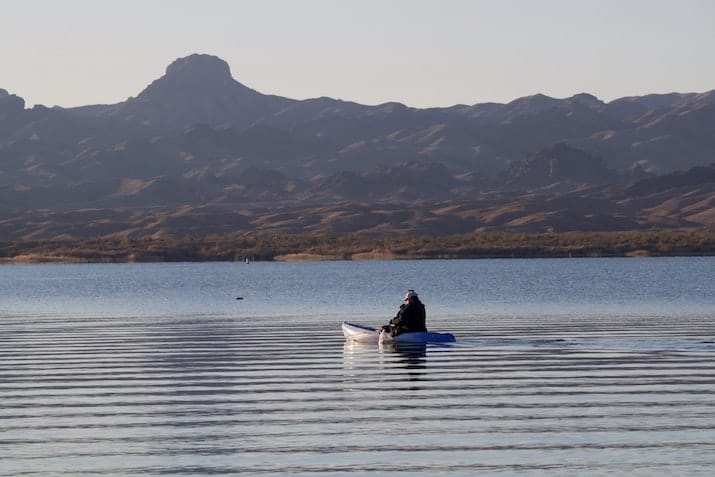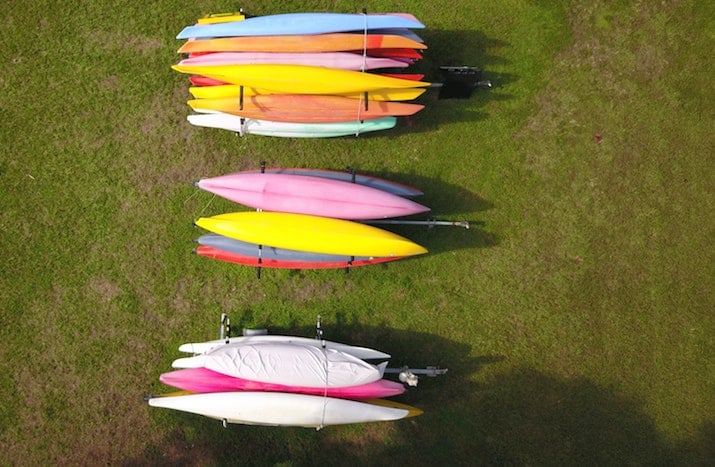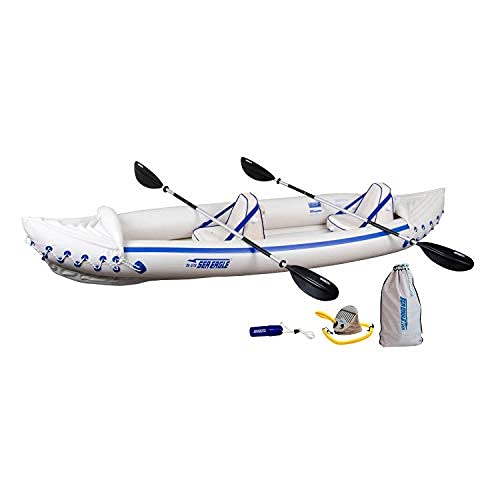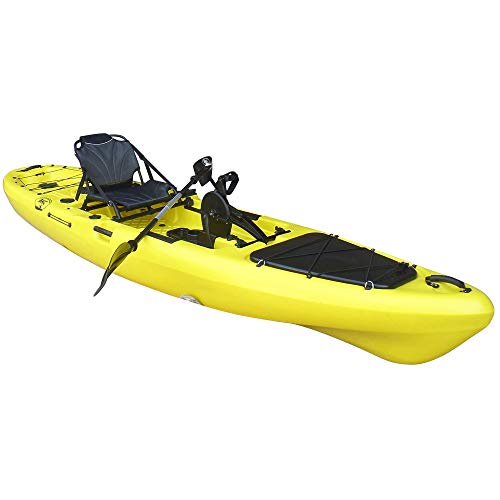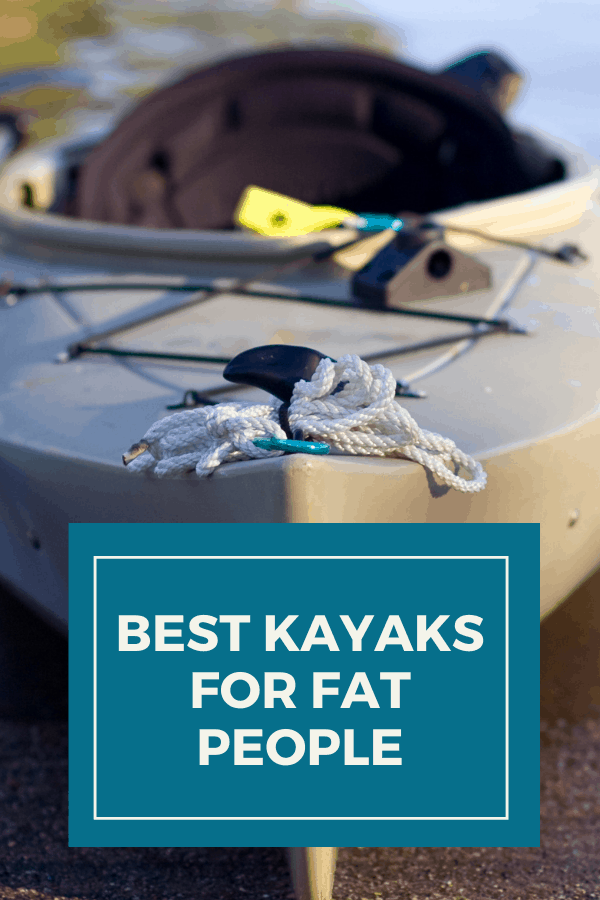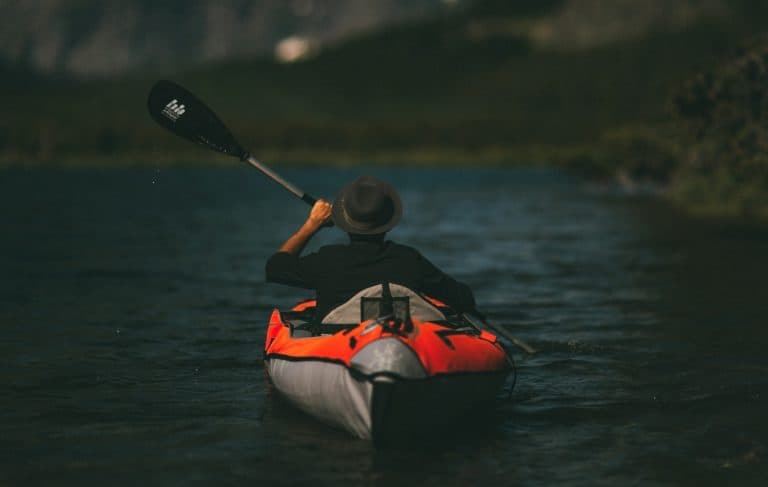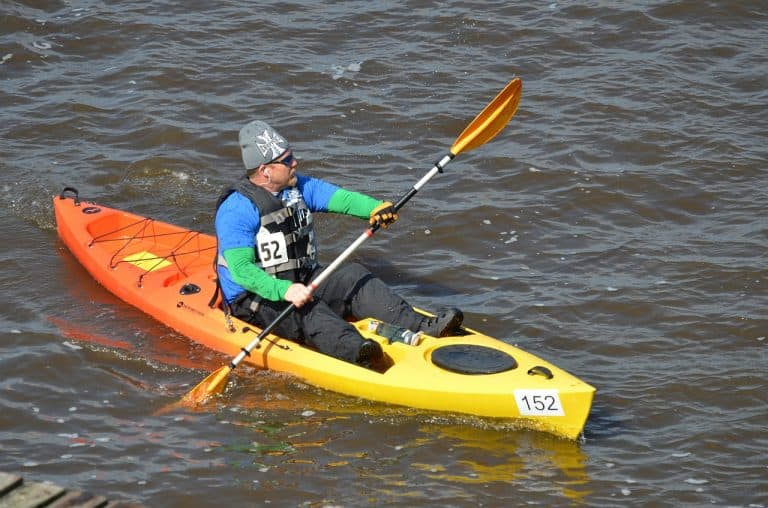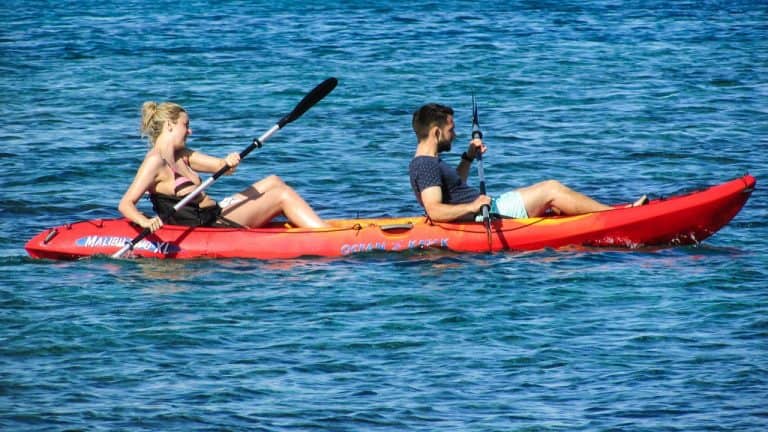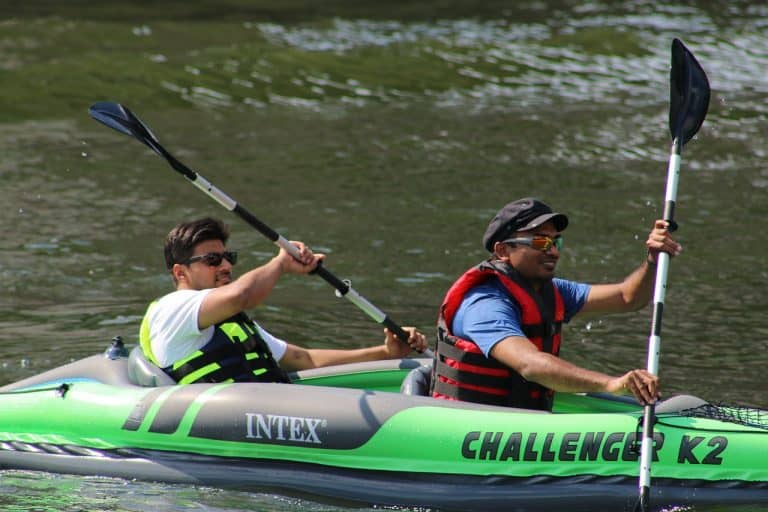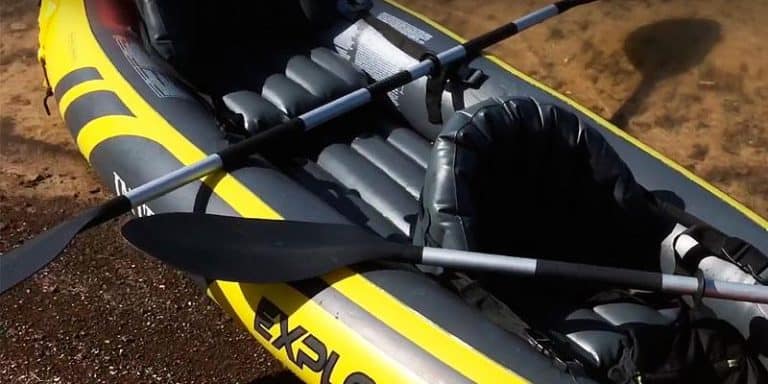Weight should not be a limiting factor in anyone’s ability to enjoy the amazing sport of kayaking. That being said, the best kayaks for fat people must be built differently than the best kayaks for kids or smaller adult paddlers.
In addition to providing more buoyancy to handle heavier weight capacities, these kayaks also have certain design elements that make them more stable for a heavy person to paddle.
These elements do lead to heavier base weights for some of these kayaks, but others are still surprisingly light when you consider how much weight they are made to handle. Our selections for the best kayaks for fat people include inflatable, rigid, and folding kayaks.
So, we have tried to include many options so that you can choose what feels best for you. Plus, our buying guide will help you determine which kayak features and specifications are most important for your personal paddling style.
All in all, we hope that you find our selections useful and we look forward to helping you find a new kayak.
Let’s get started!











Photo by Susan Weber on Unsplash
Best Kayaks For Fat People 2021
- Wilderness Systems A.T.A.K. 120
- Sea Eagle 370 Pro Inflatable Kayak
- Oru Kayak Haven TT Folding Kayak
- Wilderness Systems A.T.A.K. 140
- Elkton Outdoors Steelhead Inflatable Fishing Kayak
- Brooklyn Kayak Company PK13
- Sea Eagle 420X Inflatable Kayak with Deluxe Package
- BOTE Zeppelin Aero Inflatable Kayak
- Perception Kayaks Pescador Pilot 12
- Driftsun Rover 220 Inflatable Whitewater Kayak
Buying Guide
Photo by Anita Denunzio on Unsplash
Before we review the 10 best kayaks for fat people in 2021, there are several important things you need to think about when you are shopping for a new kayak. So let’s go over them quickly before we proceed any further.
Weight Capacity
The first thing to consider when you are shopping for a kayak is whether it will be able to support your weight. Most kayaks aren’t going to sink entirely if you overload them by 10 or 15 pounds, but it will compromise their ability to perform to their maximum potential.
The good news is that most kayak manufacturers will actively advertise the maximum weight capacity of their different kayak models. The bad news is that you don’t always want to use that rating without doing your own calculations.
In fact, we actually recommend that you set your own maximum weight threshold for your kayak. Using the maximum capacity specified by the manufacturer, you can calculate the maximum amount of weight you can actually put in your kayak before it starts to sit too low in the water.
In most kayaking circles, the number that folks agree on is 80. In other words, you should only load your kayak with about 80 percent of the weight that the manufacturer says it is rated for.
For example, let’s say the tandem kayak that you and your partner are interested in has a maximum weight capacity of 600 pounds (according to the manufacturer). Multiply 600 by 0.8 to figure the true maximum capacity of that kayak.
600 x 0.8 = 480 pounds
If you can avoid loading that kayak with more than 480 pounds, you can expect it to perform the way it was designed to perform on the water. With anything more, you start to decrease maneuverability and increase the likelihood of water entering the cockpit when you are paddling in windy and wavy conditions.
Final note:
Keep in mind that the final weight loaded into your kayak will be a combined weight of all paddlers PLUS all of your kayaking gear and accessories.
Be sure to account for 50 to 100 pounds of kayaking gear when you are calculating how much weight capacity your ideal kayak needs to be able to hold.
Storage
Another thing that you should consider is how much storage space you need in a kayak. If you plan to tackle overnight paddle trips along the shores of a large body of fresh water, you will need space to store dry bags with extra clothing, sleeping gear, and cooking utensils.
If you are searching for more of a recreational kayak, however, you won’t need as much storage space. That being said, the design of the storage space is also an important consideration.
Sit on top kayaks, for example, tend to have open storage areas that are great for kayak tackle crates, trolling motor batteries, kayak coolers, and larger accessories.
Sit inside kayaks, on the other hand, tend to have bulkhead compartments that are sealed with a waterproof hatch to keep the gear you store inside protected from the elements.
If accessibility is your top priority, you will be better off with a sit on top kayak with open storage areas. If you prefer weather protection, however, you should lean towards a sit inside kayak with sealed bulkhead compartments.
Inflatable vs Rigid vs Folding
As you move on through this article, you will find that some of the best kayaks for fat people are rigid, some are inflatable, and still others are of the folding variety. So let’s discuss a few of the pros and cons of each here.
Pros and Cons of Inflatable Kayaks
The biggest pro of inflatable kayaks is that they require much less storage space than a rigid kayak. This is what makes them so popular for travelers and folks with smaller sedans or SUVs.
On the flip side, they don’t tend to perform quite as well over long distances as rigid kayaks and they require the use of a quality electric pump to avoid tiring yourself during the inflation process (before you can even get on the water!).
Pros and Cons of Rigid Kayaks
Rigid kayaks are going to be the best choice for intermediate to advanced paddlers interested in kayak touring. They provide the best on-water performance and are also the most likely to be compatible with one of the best kayak spray skirts.
On the other hand, you will need a lot of space in your garage or in a shed at home to store a rigid kayak. Plus, they are the heaviest and bulkiest of these three kayak types when it comes to transporting your kayak from your house to your favorite paddling destinations.
Pros and Cons of Folding Kayaks
Folding kayaks are honestly a little bit new to the game, so the jury is still out on how well they perform compared to the other types. In our experience, however, you are going to get something closer to the performance of an inflatable kayak than a rigid kayak if you go with a folding design.
That being said, folding kayaks have the same advantage as inflatable kayaks when it comes to being super easy to store and transport. Plus, they eliminate the need for an electric pump during setup, which also means less opportunity for your kayak to become compromised if one of its air chambers is punctured or torn.
Reviews of Kayaks For Fat People
1. Wilderness Systems A.T.A.K. 120
That extra width (compared to many other kayaks) is what adds stability, making it suitable for a heavy person. Combined with its hull shape, that added width makes this one of the most stable fishing kayaks out there.
It is also equipped with an aluminum-framed seat that allows you to sit in an elevated position. This reduces the need to have your knees bent into your chest and allows for a more comfortable paddling experience for larger individuals.
Plus, the seatback is made with a mesh material that breathes well enough to keep you cool on hot days. The area in front of the seat in the cockpit is also flat and open so there’s plenty of room to spread out.
The A.T.A.K. 120 is also equipped with adjustable foot braces that can be set to your specific height. Additionally, this kayak’s large rear tankwell is perfect for storing live bait, a tackle crate, or a cooler full of your favorite beverages to keep you cool and hydrated on the water.
2. Sea Eagle 370 Pro Inflatable Kayak
The interior cockpit is actually spacious enough for three passengers, but this kayak only comes with two inflatable seats. Those seats, however, can be adjusted to different positions depending on where one needs extra legroom or storage space. This even allows a heavy person to remove one of the seats entirely if he wants to use it as a solo paddler.
You will probably want to get a small electric pump to help you inflate it, but it does come with a foot pump that takes about eight minutes to fully inflate the kayak.
In terms of extra accessories, the Sea Eagle 370 Pro also comes with two four-piece kayak paddles and a carry bag. Plus, this kayak is rated for up to Class III whitewater and it features two skegs on the hull to improve its overall speed and tracking ability.
3. Oru Kayak Haven TT Folding Kayak
This folding kayak boasts a maximum weight capacity of 500 pounds and the kayak itself weighs only 40 pounds. When it is fully set up, the kayak measures 16 feet long by 28 inches across.
When you aren’t using it, this kayak folds up into a case that makes it easy to store in the back of your truck or SUV. The folded size of the Oru Haven TT folding kayak measure 34” by 17” by 29”.
This is, in fact, a tandem kayak that is ideally suited for beginner and intermediate paddlers. It is made for casual, recreational paddling on calm lakes or wide, slow-moving rivers.
4. Wilderness Systems A.T.A.K. 140
The kayak also measures 14’1” long by 34 inches across and it is best suited for calm lakes or protected coastal waterways. Like the 120, it is also a fishing kayak with a number of features that keep the angler in mind.
That includes a super flat deck and cockpit area that is stable enough for stand-up kayak fishing. It also features that same aluminum-framed seating system and this one can be adjusted to three different positions to suit your preference.
The high seat position is best for active fishing when you want to get a better vantage point and enjoy easier casting. The low position is best used when you are paddling your kayak between fishing spots and the recline position is obviously useful when you want to kick back and enjoy the sunlight for a few minutes.
5. Elkton Outdoors Steelhead Inflatable Fishing Kayak
It is one of the widest inflatable kayaks which makes it a perfect option for a heavy person. The rigid drop stitch floor in the cockpit makes it feel more like a rigid kayak than a standard inflatable model. Halkey locking valves also maintain 100% air pressure without allowing leaks or seepage.
A spray shield at the front of the bow helps to keep water out of the cockpit when conditions are especially windy and wavy. Plus, it naturally creates a covered storage area at the front of the kayak.
At the stern, there is another small, covered storage area for a cooler or dry bag. This fishing kayak also comes with two kayak paddles, two folding seats, two adjustable footrests, a dual-action hand pump for easy inflation/deflation, a removable skeg, and a travel bag with backpack straps.
This travel bag makes this one of the most portable inflatable kayaks out there. If you can’t quite park right at the water’s edge, you can carry this kayak (and everything you need to get on the water) on your back until you are ready to inflate it and get paddling.
6. Brooklyn Kayak Company PK13
This is the only kayak on our list that features a pedal drive propulsion system. This allows you to power your kayak using either your hands (with one of the best kayak paddles of course) or your legs.
The pedal drive system is located in the cockpit directly in front of the seat. It features instant reverse capability and it can also be removed and upgraded to an electric trolling motor if you choose.
This kayak also comes with three built-in fishing rod holders and two water-resistant hatches for gear storage. Plus, it has a large open storage compartment for additional gear items in the stern and the elevated, aluminum-framed kayak seat makes for comfortable paddling all day long.
7. Sea Eagle 420X Inflatable Kayak with Deluxe Package
That added weight capacity makes this tandem inflatable kayak great for longer paddling journeys on calm lakes or slow-moving rivers. Plus, this kayak can be deflated and easily stored in a compact package at home or in the back of your vehicle.
The Sea Eagle Deluxe Package includes two four-piece, 94-inch kayak paddles, two inflatable kayak seats, a slide-in skeg, a hand pump, a repair kit, and the requisite carry bag to store and transport everything.
This inflatable kayak is also made with 1000-denier reinforced material with overlapped seams for added durability. Those construction elements are the main reasons why this kayak is suitable for up to Class IV whitewater.
8. BOTE Zeppelin Aero Inflatable Kayak
The inflatable seat that straps into the cockpit of this kayak provides ample cushion and helps to raise your torso for a more comfortable seated position. This kayak’s gunwales are about nine inches thick at the center and closer to 14.5 inches at the bow.
The Aero offers a maximum weight capacity of 600 pounds and it weighs just 41 pounds when fully inflated. It also measures 12’6” long by 38 inches wide and the seat’s dimensions measure 18.75 inches high by 25 inches wide by 22 inches deep.
The floor and tubes of this kayak are designed to be filled to higher pressures than most inflatable kayaks. These higher pressures make the kayak more rigid and stable once you are on the water.
9. Perception Kayaks Pescador Pilot 12
The Pilot 12 offers a maximum weight capacity of 475 pounds and the boat weighs 95 pounds before it is loaded. It measures 12’5” long by 33.5 inches wide.
This kayak is equipped with one-handed rudder control that allows you to keep your other hand on your fishing rod. Plus, it features an ergonomic mesh captain’s chair that is comfortable, but also removable if you want to upgrade your setup.
10. Driftsun Rover 220 Inflatable Whitewater Kayak
It should only take about nine minutes to inflate the floor and side tubes to 6 PSI and 3 PSI, respectively. When completed, this kayak measures 12’5” long, 38 inches wide, and 13 inches deep.
While it comes with two kayak seats, it can also be set up for a single paddler. This kayak also includes two paddles, a hand pump, a carry bag, and a removable rear tracking fin.
Our Pick – BOTE Zeppelin Aero
We are fans of inflatable kayaks because you don’t need to have a bunch of storage space at your home and inflatables are much easier to transport than rigid kayaks. Their only downfall is that they tend to be squishy and harder to maneuver than their rigid counterparts.
BOTE solves these issues by making a kayak with a floor that can be inflated up to 15 PSI and a seat that inflates up to 8 PSI. The side tubes are also designed to withstand up to 3 PSI, which makes this kayak more rigid than most other inflatables.
In addition, this kayak is great for both saltwater and freshwater environments and it comes with a carry bag that makes it easy to move around when it is all packed up. The only drawback is that it doesn’t come with its own kayak paddle, but you shouldn’t have too much trouble finding one out there!


